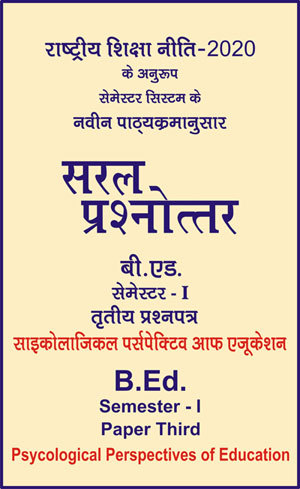|
बी एड - एम एड >> बी.एड. सेमेस्टर-1 प्रश्नपत्र-III - साइकोलाजिकल पर्सपेक्टिव आफ एजूकेशन बी.एड. सेमेस्टर-1 प्रश्नपत्र-III - साइकोलाजिकल पर्सपेक्टिव आफ एजूकेशनसरल प्रश्नोत्तर समूह
|
5 पाठक हैं |
|||||||
बी.एड. सेमेस्टर-1 प्रश्नपत्र-III - साइकोलाजिकल पर्सपेक्टिव आफ एजूकेशन (अंग्रेजी भाषा में)
Question- Explain Factors influencing learner teacher, school, and home.
Or
Enlist various factors influencing learning.
Answer-
Factors Influencing learner
(1) Beginning the work with enthusiasm : The absence of enthusiasm is a detrimental factor because while it prevails no perceptual or conceptual learning can be carried into effect. Learning is an active process and one which demands effort, the more enthusiastic a start, the more success is likely to attend the learning. More perception is adequate for the understanding of a perceptual subject while personal inadequate for the application gives better results and this is the reason for the importance given to experiments in the study of psychology. Similarly, self-study is very useful in a conceptual subject. The slow speed in learning is due, Largely not a lack of intelligence but due, to the absence for enthusiasm.
(2) Distribution of the time of study : It is better to learn a subject by introducing intervals in the time of study than to study uninterrupted for any length of time. The study of any mental subject should always be conducted on the interval pattern of time distribution. Spaced learning is better than unspaced learning.
(3) Presence of assisting Factors : The presence of assisting factors is of advantage in both perceptual and conceptual types of learning. The assistance factors in conceptual learning are dictionary, and graphs, preparing and outline, writing a precis, taking notes, etc. The use of laboratory instruments in perception. For perceptual learning is desirable.
(4) Whole or part learning according to the material to be learnt : The approach to learning whether as a whole or part, depends upon the capacity of the learner and the quantity of the subject to be learnt. The whole method is good for intelligent learner while the part method is used with advantage by the intellectually weaker learners. Suppose we have to memorise a poem. Now, if we read the whole poem at once, the relation between the various lines will become clear and assist in the learning of it. If, on the other hand, the poem is difficult and lengthy, it would be better to divide it into parts than to study it as a whole. A student used to the part method of study finds the whole method inflexible and cumbersome. As a matter of fact, as far as the matter of studying books is concerned, it is better if the student first reads the whole book and then studies the chapters individually.
(5) Assistant Habits : These too are of some importance in learning. To succeed, the student should form the habits of consulting the dictionary, making a fixed time-table for study, not working when exhausted, using, sketches, illustration and briefs, studying alone in the morning and evening, repeating the lesson, according to plan and with regularity, minimising lip movement and reading silently and concentrating the mind, etc.
(6) Other Assisting Conditions : Beside the conditions mentioned above, the following conditions also assist in mental study, absence of fatigue and boredom, presence of average brain and abilities, and active attention no nervous or emotional tension, absence of economic worries, absence of worry about personal and family problems.
Assisting conditions in Motor Learning : The above mentioned conditions are also applicable to motor learning as much as they are applicable to mental learning. Practice is of great importance in motor learning, because it is the only way of obtaining skill. Reward is preferable to punishment almost with exception but in some cases punishment may prove efficacious. Healthy rivalry also affects progress in motor as well as other learning but it should not be allowed to assume harmful proportions.
The knowledge of results favours motor learning and it is an important condition because motor learning is not possible without it. In an experiment, ten students were made aware of the results while they were being trained. After sometime, the light was switched off so that they no longer received any knowledge of the results. Consequently, their learning curve steadily declined.
The students were aware, up to the 200th time, of the results but on subsequent occasions, the light was switched off and they lost contact with the result of their work. The knowledge of results creates a tendency to repeat the successful work while there is improvement in effort and enthusiasm is magnified or boosted. Similarly, it is better to vary the work or to provide rest intermittently than to work uninterrupted for too long a time.
|
|||||














